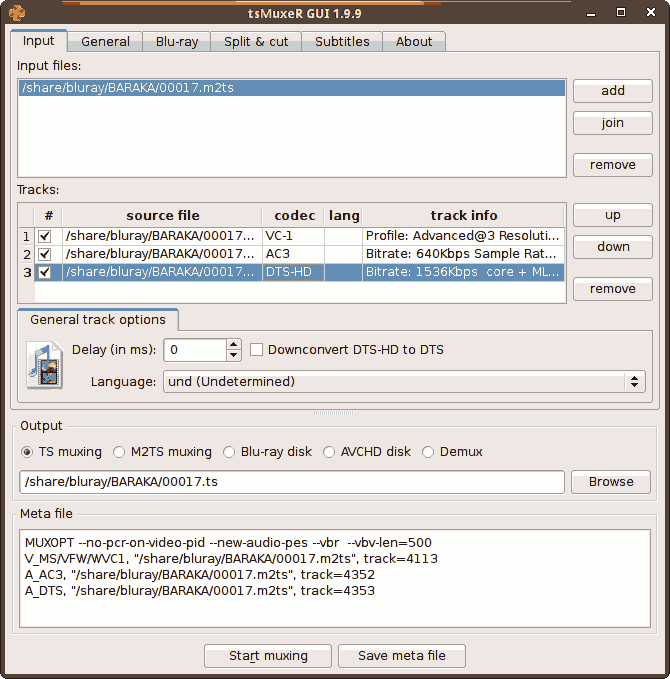Bluray
State of play as of December 2012.
Rip
Until recently the only way to rip Bluray discs on a PC was with AnyDVD HD in Windows, which copies the contents of the disc into a folder after removing the encryption and DRM. You then had to use something else to select streams from the M2TS files, and remux them into a sensible container (Matroska).
Use MakeMKV
Now you can skip several steps by using MakeMKV instead. This will produce a Matroska file straight from the disc, with the desired streams you select, leaving out all the various subtitles and foreign language dub tracks you don't need.
Transcode
Transcode to H.264
- NOTE
- ffmpeg developers fed up with Michael Niedermayer forked it in March 2011 and formed the libav project, with its avconv tool. Most of the key ffmpeg developers now contribute to this project instead. Update 2020: looks like it's fizzled out.
In this example, I am processing my Bluray copy of Baraka.
Having obtained a Matroska file containing the main title of the disc, we can use avconv to squash the video track from 28 GB down to about 10 GB using the constant rate factor quality setting:
avconv -i Baraka-rip.mkv -c:a copy -c:v libx264 -crf 21 Baraka.mkv
Crop
We can determine the crop using the cropdetect video filter, which will output some numbers we can then use in the encode:
avconv -i Baraka-rip.mkv -vf cropdetect /tmp/x.mkv
This will splurge output for an optimum crop per frame, which should settle out on:
[cropdetect @ 0xa3c540] [...] crop=1920:876:0:102
Which we now add to our transcode command:
avconv -i Baraka-rip.mkv -c:a copy -c:v libx264 -crf 21 \
-vf crop=1920:876:0:102 Baraka.mkv
User defined H.264 preset
For best quality, we can improve the H.264 options by creating our own H.264 preset.[1] To do this, we stick a bunch of good quality x264 options in ~/.avconv/libx264-gnarly.avpreset. Then we simply go
avconv -i Baraka-rip.mkv -c:a copy -c:v libx264 -crf 21 \
-pre gnarly \
-vf crop=1920:876:0:102 Baraka.mkv
Since quality is paramount, we should use B frames as references, turn CABAC and trellis encoding on, bump up the motion estimation and subpixel search methods, increase the motion estimation range (especially for HD resolutions), turn on the 8x8 DCT, enable weighted B frame prediction, bump up the B frame options, use mixed reference frames (especially if using multiple B frame references), and disable the fast P frame skip for smoother skies and plain areas. This produces a great quality, highly efficient encode (small file size), at the expense of much longer encoding time and higher CPU demand when decoding. Here's my preset file:
# THIS PRESET FILE IS NOW OBSOLETE # It was written for ffmpeg and needs an avconv rewrite. # For now just use the slower libx264 preset, with -pre slower g=250 keyint_min=25 sc_threshold=40 i_qfactor=0.71 qcomp=0.6 qmin=10 qmax=51 qdiff=4 me_range=24 me_method=umh subq=7 cmp=+chroma partitions=+parti8x8+parti4x4+partp8x8+partb8x8 refs=5 bf=16 wpredp=2 b_strategy=2 directpred=3 coder=1 trellis=2 flags=+loop flags2=+bpyramid+wpred+mixed_refs+dct8x8-fastpskip
Single pass constant rate factor (CRF) is best, since two-pass is only relevant if we care about exact file size. A good CRF range is 18-23, with 0 being lossless and 51 being maximum compression and probably awful. We can also use multiple threads to speed it up:
avconv -i Baraka-rip.mkv -c:a copy -c:v libx264 -crf 21 \
-pre gnarly \
-threads auto \
-vf crop=1920:876:0:102 Baraka.mkv
Cartoons
For anime and cartoons, bump up the deblocking and noise reduction filters.
Subtitles
Bluray subtitle streams can now mux into Matroska files fine. You may want to convert them to plain text SRT using some of the subtitle OCR tools out there if you really have nothing better to do, or just pull one off one of the dozens of dodgy websites dedicated to that sort of thing.
M2TS files
Bluray video is stored in a modified version of the MPEG-TS container format in the BDMV/STREAM folder. The modification is an extra 4 byte time code on each MPEG-TS packet, increasing the packet size from 188 bytes to 192 bytes, apparently in order to better support buffering and out-of-order writing to random-access media. It is unclear whether this is an MPEG Committee sanctioned modification, but there appears to be some standardisation through something called AVCHD. As of 2012 most players can now handle playing decrypted M2TS files.
TS Muxer
We can also use tsmuxer[2] to deal with M2TS files, and in particular extract the AC3 and DTS cores from Dolby TrueHD and DTS Master Audio tracks, respectively.
Adding a MIME type
Ubuntu still doesn't see these files as video files - edit /usr/share/mime/packages/bluray.xml and copy in this:
<?xml version="1.0" encoding="UTF-8"?>
<mime-info xmlns='http://www.freedesktop.org/standards/shared-mime-info'>
<mime-type type="video/bluray">
<alias type="application/bluray"/>
<alias type="video/avchd"/>
<sub-class-of type="video/mpeg"/>
<comment>Blu-ray/AVCHD Video</comment>
<magic priority="50">
<match value="\x47\x40\x00\x10\x00\xb0\x00\x11" type="string" offset="4"/>
</magic>
<generic-icon name="video-x-generic"/>
<glob pattern="*.m2ts"/>
<glob pattern="*.mts"/>
</mime-type>
</mime-info>
Then update your MIME database:
sudo update-mime-database
You should then be able to open M2TS files with an mplayer-based media player.
Playback
NVidia has VDPAU. Dear ATI, where's that fancy video acceleration you promised? In the meantime, we can speed up playback using multithreaded mplayer[3]:
git clone git://repo.or.cz/mplayer cd mplayer git checkout origin/mt git submodule init git submodule update sudo apt-get build-dep mplayer ./configure --prefix=/usr make sudo checkinstall --fstrans=no --install=no --pkgname=mplayer-mt --pkgversion "1:0.svn`date +%Y%m%d`-0.0ubuntu1" --default
mplayer -lavdopts threads=4 Baraka.mkv
And if it still sucks,
mplayer -lavdopts skipframe=nonref:skiploopfilter=all:fast=1:threads=4 Baraka.mkv
